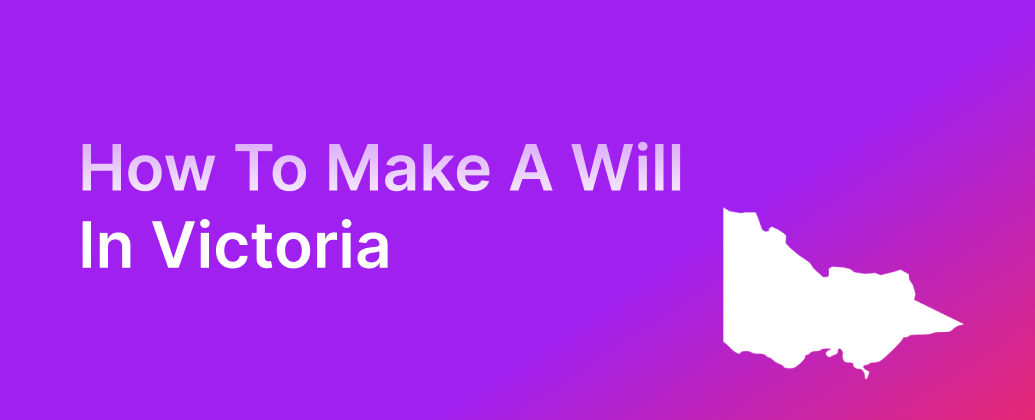
How To Make a Will in Victoria (2025 Guide)
A Step-By-Step Guide for creating a Last Will and Testament In Victoria
Create a legal Will to protect your assets and loved ones. Under the Wills Act 1997 (Vic), anyone over 18 with testamentary capacity can draft a Will. If you are ready to make your Will in Victoria, this guide explains each step—from writing your Will to signing it with valid witnesses—so you can feel confident that others will follow your final wishes.
Why you need a Will in Victoria?
A Will is an important legal document that explains how you distribute your property after death. It also lets you make crucial decisions about your family’s future. Beyond transferring assets like property and money, a Will allows you to name guardians for your minor children, which safeguards their well-being if you can no longer care for them. Without a Will, the state of Victoria decides how to divide your estate, which may not align with your wishes.
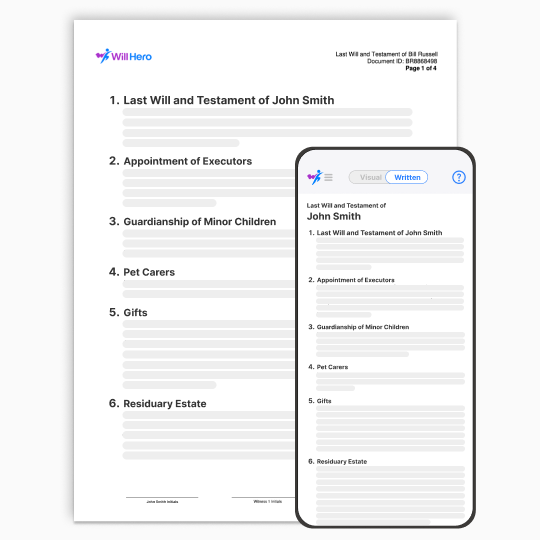
Legal Requirements to make a Valid Will in Victoria
To create a will in Victoria, you must follow specific legal requirements under the Wills Act 1997 (Vic). If you ignore these requirements, the law may treat your will as invalid and cause complications during probate. Below are the key legal requirements in Victoria:

You must be at least 18 years old. Exceptions apply if you’re married or if a court order allows it.

You must be of sound mind:
This means you understand what a Will is, what your assets include, and how you plan to distribute them.
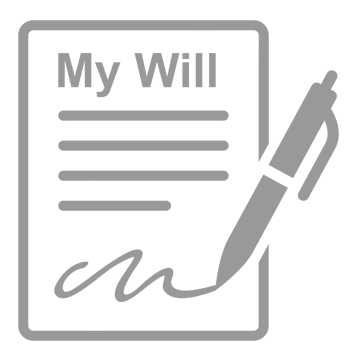
The Will must be in writing:
Victorian law does not recognise oral Wills. You need a physical document (typed or handwritten), and you must sign it in front of two competent witnesses.

Signed by The Testator and Two Witnesses:
The testator (person making the Will) must sign it, and two competent witnesses must watch the signing at the same time.
By following Victoria’s will laws, you ensure your estate goes where you intend. If your will fails to meet these requirements, the courts may contest or invalidate it, potentially deciding the fate of your estate.
Step-by-Step: How to Make a Will in Victoria
1. Choose an Executor
An executor carries out your will and manages your estate after you pass away. They distribute your assets according to your wishes and pay outstanding debts. They also handle the legal steps to settle your estate.
When you choose an executor, pick an adult who is organised, trustworthy, and capable of managing these responsibilities. People often select a family member, close friend, or professional advisor.
It’s wise to name a backup executor if your first choice cannot serve.
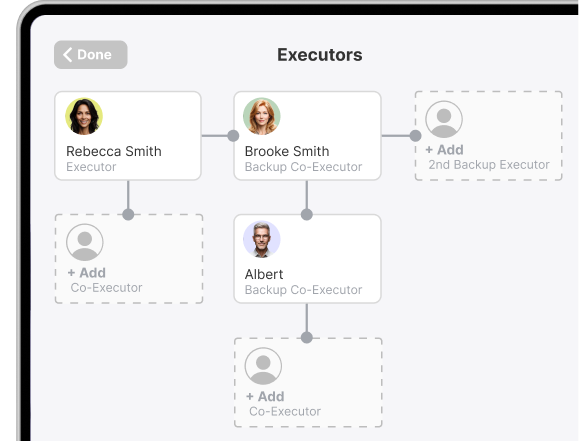
2. Name a Guardian for Minor Children
If you have minor children, appoint a guardian to care for them when you die. Your guardian oversees their upbringing, including decisions about education, healthcare, and overall well-being.
Although this step is optional, parents should still consider it. In Victoria, if you don’t name a guardian, the court appoints one—and that choice might not match your preferences.
It’s wise to name a backup guardian in case your first choice is unable or unwilling to serve.
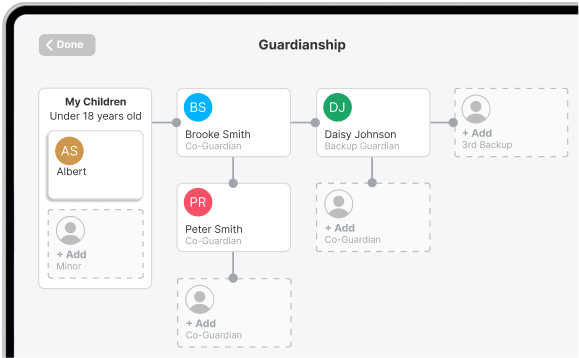
3. Name a Pet Carer
Under Victoria’s law, you can add provisions to your will to care for your pets. Name someone to look after them, and allocate resources for their upkeep. This approach keeps your furry friends safe even after you’re gone.
Although optional, this step matters if you want control over your pets’ future. In Victoria, if you don’t name a pet carer or guardian, your Executor decides who looks after them.
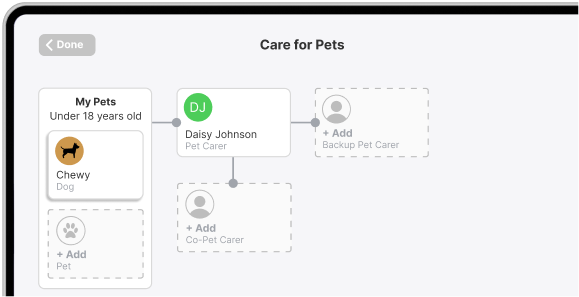
4. Decide who inherits your Residual Estate
Your residual estate includes everything left after taxes, expenses and specific gifts have been distributed. Choose one or more beneficiaries, such as family members, friends, or charitable organisations, to receive your remaining assets. List each beneficiary’s full name and note the share they receive. It’s also wise to name backup beneficiaries.

5. Gifting Specific Items
If you have specific items—such as a family heirloom, a piece of jewelry, or a property—that you wish to give to a particular person, you can designate these in your will. Be as detailed as possible to avoid any confusion or disputes later. It’s best practice to take stock of all your assets before drafting your Will.

6. Any Additional Instructions or Provisions?
It’s optional to include special instructions, such as how you’d like your funeral to be conducted or instructions to sell an asset. You might also wish make a gift conditional, or leave a fund in trust until beneficiaries reach a certain age.
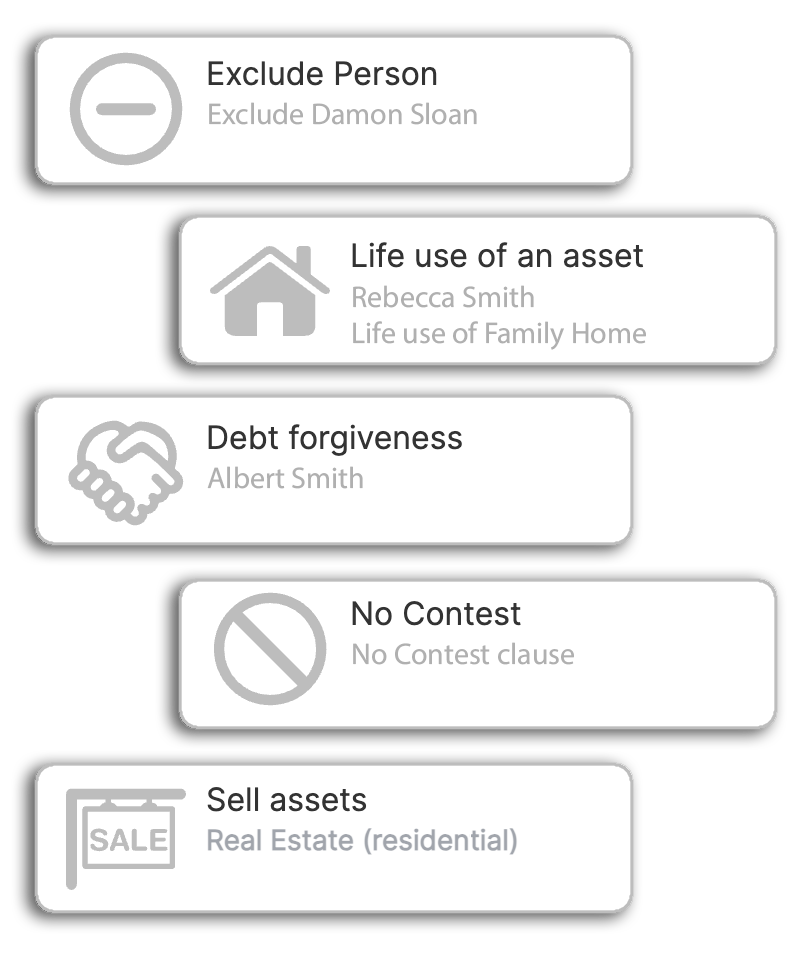
Review Your Will
Confirming Roles in Your Will
Before you finalise your Will, confirm that your chosen Executors, Guardians, and Pet Carers accept their roles. This step ensures each person is prepared and agrees to fulfill their responsibilities, which helps you avoid complications when carrying out your Will.
It’s also best practice to check with the people you nominate, and their backups, to confirm they want these responsibilities.

Executors
Guardians
Pet Carers
Test Your Will
Before you complete your Will, it’s important you think through your wishes and see if you have planned for different potential scenarios, such as people in your Will passing away before you, or conditions not being met.
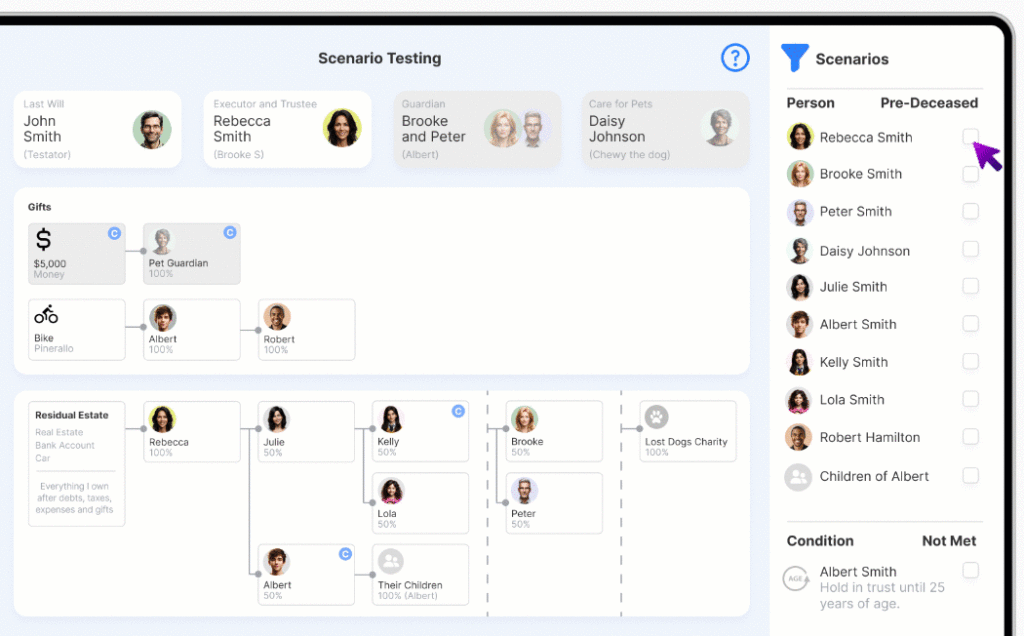
Signing Your Will
Signing Your Will In Front of Witnesses
After you draft your will, print and sign it as the next critical step. In Victoria, you must follow specific legal requirements during this process for the will to be valid.
Witness Requirements
In Victoria, sign your will in front of at least two witnesses. Each witness must:
- Be at least 18 years old.
- Understand that they are watching you sign your will.
- Ideally not be a beneficiary or spouse of a beneficiary, because Victorian law allows beneficiary witnesses but may require extra legal steps to confirm their inheritance.
After you sign, both witnesses must also sign, confirming they were present and that you appeared to be of sound mind at the time.
Is Notarisation Required?
You don’t need a notary for Wills in Australia (including Victoria). If your Will meets the witness requirements, the Court generally accepts it as valid without a notarial seal or stamp.
What about Online Wills in Victoria?
If you use any Online Will platform in Victoria to make your Will, it is essential that your Will is printed and signed according to these instructions. Having a Will online in Victoria that has NOT been printed and signed will not be considered valid.
Storing Your Will
Keep Your Will Safe
After you sign and witness your will, store the original document in a secure location. In Victoria, only the original signed copy is legally binding—digital versions are not. If you lose or damage this document, your loved ones may face complications and delays distributing your assets.
Victoria does not maintain an official government registry for Wills while you’re alive. Below are some secure storage options:
Store at Home
Keep your will at home or leave it with a trusted family member or friend. Make sure they understand the importance of safeguarding the document.
With an Attorney
If you worked with a lawyer, they may offer to store the original in a secure location for you.
Trusted Person
You can also leave your will with a reliable family member or friend, ensuring they know how vital it is to protect it.
Although you can store documents online for easy reference, only the original signed copy holds legal weight. Make sure your executor knows where to find that physical copy to avoid legal complications.
FAQs: Making a Will in Victoria
1. What Are My Options for Creating a Will in Victoria?
In Victoria, you have several options for creating a will:
- Hire a Lawyer: If you have a large or complex estate—or you want personalised legal advice—consider hiring an attorney. A lawyer can help with estate tax planning, trusts, or any other specialised needs.
- Use an Online Platform: For straightforward estates, online will platforms like Will Hero offer an affordable, convenient way to create a valid will online in Victoria. Our visual interface simplifies each step, ensuring you cover all essential details.
- Handwrite Your Will: You can create a handwritten will in Victoria if you sign and date it in front of two witnesses to meet the formal requirements.
2. Do I Need a Lawyer to Make a Will in Victoria?
No, you don’t have to hire a lawyer to create a valid will in Victoria. If your estate is simple and your wishes are clear, you can draft a will using an online platform or even handwrite one. However, if you have a complex estate or specific concerns about tax planning or trusts, consulting a legal professional can help.
3. Are Handwritten Wills Valid in Victoria?
Yes, you can handwrite your Will in Victoria, and it remains legally valid if you follow the proper steps. Under the Wills Act 1997 (Vic), the will-maker must sign any typed or handwritten Will in front of two witnesses who watch at the same time. If a handwritten Will doesn’t meet these requirements, the Supreme Court of Victoria may still use its “dispensing power” to declare it valid. However, that process is uncertain and can be costly. To avoid challenges, use two independent witnesses each time you sign a Will—no matter how you create it.
4. Is there Any Inheritance Tax in Victoria?
Australia, including Victoria, doesn’t impose inheritance or estate taxes; the country abolished these “death duties” decades ago. In some situations, you may owe capital gains tax (CGT) if you sell an inherited asset at a profit, but death doesn’t automatically trigger any tax. If you’re concerned about possible tax implications—such as CGT on property or investments—consult a tax professional.
5. Do I Need to Notarise My Will in Victoria?
No. In Victoria, you don’t need a notarised will for it to be valid. However, you must sign your will in front of two witnesses, and they must sign it as well.
6. Can I Change My Will After It’s Signed?
Yes. You can change or update your will at any time, provided you have sound mind. You have two main options:
- Add a Codicil: A codicil acts as a legal amendment to your existing will. Sign and witness it just like the original.
- Create a New Will: Draft a new will that replaces your old one, and clearly state that it revokes all prior wills and codicils. After signing, destroy every copy of the old will to avoid confusion or disputes.
7. What Happens if I die without a Will?
If you die without a will in Victoria, the state’s intestacy laws (under the Administration and Probate Act 1958 (Vic)) govern how to distribute your estate. This means your closest relatives (as defined by law) receive your assets. If you have no close relatives, the state may take your property. Also, if you have minor children, the court chooses their guardian, which may conflict with your wishes. Creating a will lets you control these crucial decisions.
8. What is Probate?
Probate is the legal process that begins after someone dies. It confirms a will’s validity and ensures the estate is distributed according to the deceased’s wishes—or under state law if no will exists.
In Victoria, the Supreme Court (via its Probate Office) grants probate. Typically, the executor applies for a Grant of Probate with the court. This process usually includes the following steps:
Filing the Will
The executor files the will with the Supreme Court of Victoria, along with a petition to open probate. If no will exists, the executor submits a petition for intestate succession.Appointing an Executor
If a valid will names an executor, that person manages the estate. If the will doesn’t name an executor—or if no will exists—the court appoints an administrator instead.Inventory of Assets
The executor identifies and values the deceased’s property, including bank accounts, investments, personal belongings, and any debts.Paying Debts and Taxes
Before distributing the estate, the executor settles all debts, taxes, and expenses (e.g., mortgages, credit card bills, medical costs).Distributing the Estate
Once debts and expenses are cleared, the executor distributes remaining assets to the will’s beneficiaries. If no will exists, assets go to heirs under Victoria’s intestate succession laws.Closing the Estate
After all obligations are met, the executor files a final petition to close the probate process.
9. How Long Does Probate Take?
In Victoria, probate can last from a few months to over a year. Factors such as estate complexity, beneficiary disputes, or a contested will can extend the timeline. On average, probate finishes in about 9 to 18 months.
10. Can Probate Be Avoided?
Certain assets avoid probate through:
- Joint Tenancy/Ownership (Right of Survivorship): Property held in joint tenancy automatically passes to the surviving owner.
- Beneficiary Designations: Superannuation (retirement) and life insurance policies often bypass the estate if you name beneficiaries.
- Family Trusts: A family trust lets you transfer asset ownership into the trust while you’re alive. The trust holds these assets during your lifetime, then transfers them to your chosen beneficiaries after death. Because the trust, not you, owns the assets, they don’t require probate. Make sure you move items (real estate, bank accounts, investments) into the trust correctly to benefit from this arrangement.
For many, creating a living trust or adding clear beneficiary designations streamlines the estate process and reduces probate time and costs.
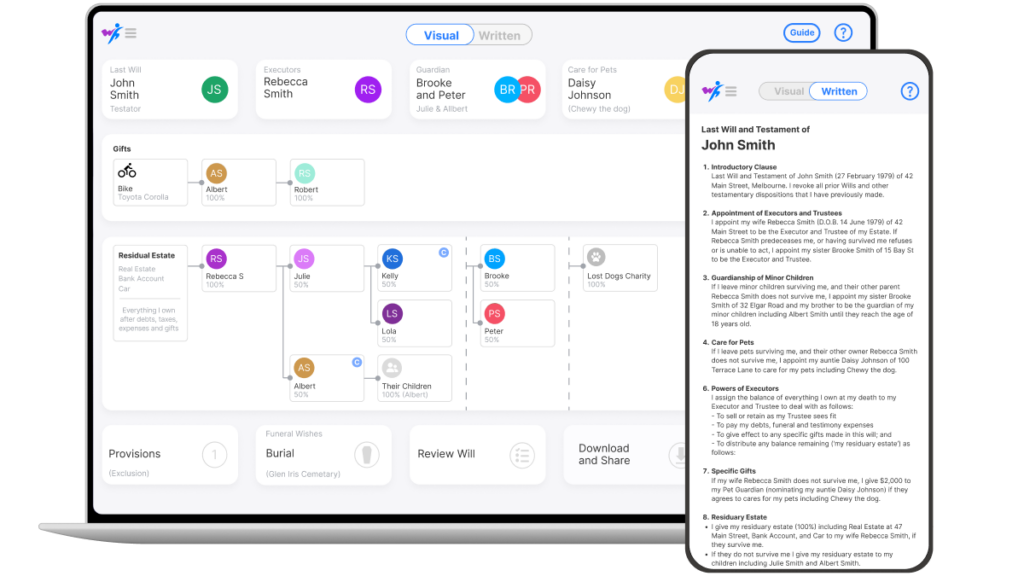
Ready to Creates Online Wills in Victoria?
For many, taking the first step is the hardest part. If you need help, why not try Will Hero? You can sign up for free and draft a Will visually. Clarify your wishes as you learn about Wills and estate planning with our guides and AI Assistant.
We’re making it easier than ever to create your very own online wills in Victoria. You can also test your Will under different scenarios using a free Scenario Testing account. Upgrade only if you want to review the written document. Will Hero aims to make Will creation more visual, interactive, and even fun—instead of difficult or daunting.
No matter how you choose to make your Will, start today and protect your loved ones and your legacy.
Will Hero helps you make Online Wills in Victoria
With a secure, affordable, and lawyer-approved service, we’re making it easier than ever to create your very own online wills in Victoria. Here’s how:
Visual Approach
Make your Will online using interactive visualisations to better understand how your Will works.
AI Assistance
24/7 AI assisted help to answer any questions about Wills, estate planning and Victoria local laws.
Scenario Testing
See how different circumstances such as people passing away before you impact your estate.
Legally Valid in Victoria
Designed to meet Victoria’s State-specific legal requirements.
Lawyer Approved
Drafted by Lawyers.
Personalised by you. You can even make more than just a simple Will.
Great Value
30-day money back guarantee.
No questions asked!
The Best Way to Make Online Wills in Victoria
Crafting a will is one of the most critical steps you can take to protect your legacy, loved ones, and assets. With the help of our purpose built tool, creating online wills in Victoria has never been more straightforward.
Follow the links and start creating a will in a matter of minutes, or call us on 1800 136 069 if you have any questions. We’ll be more than happy to help!
Disclaimer: This blog provides general information only and does not constitute personalised legal advice.